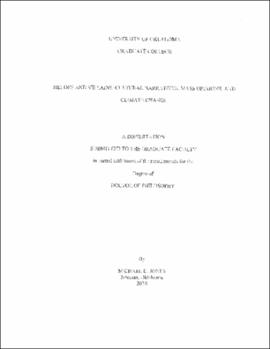| dc.contributor.advisor | Jenkins-Smith, Hank C | |
| dc.creator | Jones, Michael David | |
| dc.date.accessioned | 2019-04-27T21:23:19Z | |
| dc.date.available | 2019-04-27T21:23:19Z | |
| dc.date.issued | 2010 | |
| dc.identifier | 99143371702042 | |
| dc.identifier.uri | https://hdl.handle.net/11244/318554 | |
| dc.description.abstract | Global climate change is easily identified as one of the most pressing and contentious policy problems facing not only the United States, but the human race. In a democratic society such as our own, understanding the public's capacities and tendencies in processing information and forming opinions about climate change has serious and far-reaching policy implications. Historically quite low, public knowledge about climate change is now on the rise, as is the importance of the issue on the public agenda (Leiserowitz, 2005). Consequently, it is not unreasonable to expect the public, for better or worse, to play a larger role in future climate policy melees. In light of the prospect of an increasingly important public role in shaping policy contours, this dissertation seeks to test how and why individuals form opinions and assessments of risk about climate change. In order to address these questions, two theories that account for both individual internal factors and external stimuli in opinion formation and change are merged to create a Cultural Narrative Model (CNM). | |
| dc.description.abstract | The first, Cultural Theory (CT), argues that there are four exclusive value orientations to which individuals subscribe based upon preferred levels of group interaction and the degree that these groups are expected to constrain the individual's beliefs and behavior. These value orientations are always present and influence how incoming information is processed (Wildavsky, 1987; Thompson et al., 1990). CT has a proven history of explaining variation in opinion and risk perceptions (Wildavsky & Dake, 1990); however, the influence of message structures in CT scholarship is lacking. This research operationalizes narrative theory to address this gap. Seeking to determine if cultural narratives help explain variations in climate change opinion related dependent variables, two research questions are addressed: | |
| dc.description.abstract | RQ1: Narrative Structure: Does narrative structure influence opinions related to climate change? | |
| dc.description.abstract | RQ2: Cultural Narrative Content: Does cultural narrative content explain variation in opinions related to climate change? | |
| dc.description.abstract | Specific hypotheses derived from the above research questions are tested using an online internet survey with a built in experimental design. Four experimental tracks are employed, including a control list and three cultural narrative treatments. Several statistical tools, including analysis of variance and OLS regression analysis are used to assess each hypothesis. The survey sample consists of roughly fifteen-hundred nationally representative respondents surveyed from within the United States. | |
| dc.description.abstract | Findings indicate that while cultural content does not appear to influence opinions about climate change, narrative structure plays a powerful role in shaping opinion. Specifically, findings show that the vehicle through which narrative structure persuades is the hero character. Examining eleven climate change opinion related variables, as positive affect for the hero increases so too do respondent preferences and beliefs in direction specified by the cultural narrative treatments. | |
| dc.format.extent | 306 pages | |
| dc.format.medium | application.pdf | |
| dc.language | en_US | |
| dc.relation.requires | Adobe Acrobat Reader | |
| dc.subject | Climatic changes--Public opinion | |
| dc.subject | Climatic changes--Public policy--United States--Public opinion | |
| dc.subject | Public opinion--United States | |
| dc.subject | Discourse analysis, Narrative | |
| dc.title | Heroes and Villains: Cultural Narratives, Mass Opinions, and Climate Change | |
| dc.type | text | |
| dc.type | document | |
| dc.thesis.degree | Ph.D. | |
| ou.group | College of Arts and Sciences::Department of Political Science | |
